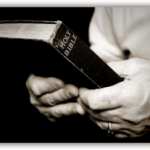 I very much enjoyed reading an article Dan Phillips wrote entitled, “The public reading of Scripture: ten pointed pointers”, found here:
I very much enjoyed reading an article Dan Phillips wrote entitled, “The public reading of Scripture: ten pointed pointers”, found here:
Some of the specifics of the elements of our services have little or no specific Scriptural directive; some are just common-sense. For instance, there’s no apostolic instruction about how to handle (or whether to have) announcements, or the welcoming of visitors. There’s no order of service. No dress code. Nothing about hymnal-color…or hymnals. Though singing is enjoined (Col. 3:16), not a whisper of specific direction deals with beat or rhythm or octave or number of verses or choruses or types of instruments — except that we can be fairly assured that none of us precisely does what apostolic churches did, stylistically.
But there is a word about what ESV (perhaps over-)translates as “the public reading of Scripture” (1 Tim. 4:13). Apostolic-age church services involved reading some portion or portions of God’s Word (cf. Col. 4:16; 1 Thess. 5:27; Rev. 1:3). That fact alone makes the reading of Scripture important; God thought enough about it to mention it. Nor is this the first time reading the Word came to the fore, as it featured prominently in the Water Gate Revival (Neh. 8:3, 8, 18).
While there are many and excellent books about preaching, and plenty about music and singing, and truckloads about praying, there is less of any prominence about this facet of the worship of God. I’m sure others have blogged about it, but I keep learning that some of the most helpful posts are about fairly basic issues. So we offer here a few brief and pointed pointers about the public reading of Scripture.
Take it as seriously as the preacher takes his sermon. God said to do it. That makes it important. Unless you’ve no choice, do not let the pulpit be the first time your eyes touch and your mouth forms these words. Some may think, “It’s just reading. How hard can it be?” That makes as much sense as a preacher sneering “It’s just talking. How hard can it be?”
Do not underestimate the importance or potential of this moment. This is the word of God. These are the most important words you will ever speak, the most important words your hearers will ever hear. I know you’ll think as I do, “It’s Spurgeon!”; but consider this story from Spurgeon’s autobiography:
The Lord set His seal upon the effort even before the great crowd gathered, though I did not know of that instance of blessing until long afterwards. It was arranged that I should use the Surrey Gardens pulpit, so, a day or two before preaching at the Palace, I went to decide where it should be fixed; and, in order to test the acoustic properties of the building, cried in a loud voice, “Behold the Lamb of God, which taketh away the sin of the world.” In one of the galleries, a workman, who knew nothing of what was being done, heard the words, and they came like a message from Heaven to his soul. He was smitten with conviction on account of sin, put down his tools, went home, and there, after a season of spiritual struggling, found peace and life by beholding the Lamb of God. Years after, he told this story to one who visited him on his death-bed. [Spurgeon, C. H. (1899). C. H. Spurgeon’s Autobiography, Compiled from his diary, letters, and records, by his wife and his private secretary, 1854–1860 (Vol. 2, p. 239). Chicago; New York; Toronto: Fleming H. Revell Company.]
Understand the passage you read. Wouldn’t it be strange if the preacher preached on a passage he didn’t understand, hadn’t studied? Give thought to this passage, so that you can by inflection convey the meaning of the passage.
Master any difficult words. God’s people are gracious, and will not hound you for stumbling over Mahershalalhashbaz or Sepharvaim or Hazarmaveth or Arpachshad. But you knew it was in the text, and you knew it would be challenging, and you were probably asked to do this days in advance. So why would you not have worked at it until it flowed fluidly off your tongue? We want attention on the text, not on our lingual gymnastics.
Pray for God’s help as you prepare. Wouldn’t it be odd if the preacher’s first prayer for his sermon were that uttered in the seconds before his introduction? Pray that God help you understand the passage, that He apply it to your heart; pray that He will apply it to all the hearts of all the hearers. Seriously — and I say this as a preacher — what you will read will be of absolutely vital importance. God will judge you and your hearers for how you respond to these words (cf. John 12:48)! It’s no small thing; it’s a moment of crisis.
Practice it aloud. Reading to yourself is a different dynamic than reading to others; it simply is. Try to imagine yourself reading to others. Get a room alone if possible, and speak up, just as you will during the service.
Take your time. This is a vital part of the service, not a bit we rush through so we can get to the meat. It’s God’s Word! Announce it, wait for the majority of page-turning to stop. Then read in an unhurried pace. Don’t verbally drag your feet like a zombie, but don’t race like a dragster. It isn’t an auction.
Give full and meaningful inflection. It is God’s Word! He did not entrust it to angels, but to men! It’s a fearful and sobering thing for us to take His word on our lips. So work this out during your practice: vary your pace, your pitch, your tone. Read it with meaning. You’re rightly put off by a bloodless, bland, lifeless preacher who sounds like he’s reading a legal document or instructions for assembling a tricycle. Don’t be that man. This deserves your best effort. For instance, don’t read Mark 15:24 as “And-they-crucified-him-and-divided-his-garments-among-them…” Perhaps read it as “And [pause a beat] they crucified him [pause a double beat, at the horror of it] and divided his garments among them…” Don’t dash coolly through Galatians 1:6, “I-am-astonished-that-you-are-so-quickly-deserting-him…” as if you were a Dalek. Sound astonished! Perhaps, “I am… astonished… that you are so quickly deserting him who called you in the grace of Christ, and are turning to… a different gospel…” You don’t have to Shatner it, but don’t Robbie the Robot it, either. Nor is there any virtue in a sepulchral, unnatural, affectedly “holy” intonation. The words of God should ring in your hearers’ ears, and stir their conscience.
Use what you’ve got, as appropriate. Some of us are gifted as readers, some are not. As with giving, I think “if the readiness is there, it is acceptable according to what a person has, not according to what he does not have” (2 Cor. 8:12). If it’s all you can do to get through a passage without collapsing into burbling, God bless you, give what you’ve got, God will be pleased and glorified and the saints edified. But if you can convey the tone and tenor of the passage in your reading, do that. And so there are passages of Scripture that should be fairly shouted, and parts that should be fairly whispered. It isn’t a question of dramatics, it is a matter of adorning. Inflection and emphasis are as much a part of communication as is word choice. We suit the manner of reading to the content of the passage for the same reason we don’t wear swim suits or clown suits to the pulpit.
Consider a closing word. I often close a reading with, “This is the Word of God,” or “This is the Word of the Lord.” In some churches, hearers respond with “Thanks be to God.” Some say something like “God grant that we hear and head God’s inerrant Word,” or “Thanks be to God for His inerrant and infallible Word.” It may be a response in unison, it may be left to individuals to say that, “Amen,” or nothing at all. It’s a time-honored practice, and in my opinion it makes reverent sense.
The reading of Scripture is a vital and apostolically-enjoined facet of the gem of divine worship. If these exhortations serve to enrich readers’ and hearers’ experience of the Word in worship, glory to God.


